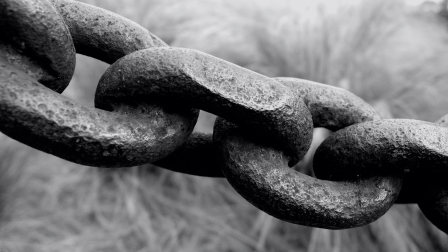Link building is difficult, and columnist Julie Joyce reminds us that there are no risk-free, fool-proof tactics within this discipline.

Countless articles about links are written every day. Many of them are excellent, filled with some really good tips to help you do well. Some of them are awful, full of bad advice. However, the biggest thing that bugs me about link-building advice is this: a lot of it pretends to offer guarantees.
People talk about how to Penguin-proof sites, how to avoid being manually penalized and so on. As an extremely paranoid link builder who has seen many examples of unfairness online, I don’t believe there are any guarantees, and below you’ll see why that is.
1. No link is risk-free
How many types of links have previously been acceptable, only to eventually be written into Google’s guidelines as being a link scheme or some other violation?
For example, theoretically, a nofollowed link should be risk-free. Would I bet on it? Nope. And honestly, who has a profile full of only nofollowed links? That would look very strange, no? What’s going to happen when Google finds a way to do something different with nofollow? What if they decide it’s not enough, and they introduce something else?
2. You can’t always tell if a link is editorial or not
Neither can the search engines. It really, really, really bugs me when people say that you can accurately tell what went into getting a link. You cannot — unless it was done very poorly and obviously.
I’m sure we’ve all seen links that we initially thought were paid, but they turned out not to have been. I’m sure we’ve all seen links that we thought were editorially given, but, in reality, they were paid. There are very clever people in SEO and link development, and you can bet that you can’t always outsmart them.
There are some obvious clues that a link was paid for, of course, but I guarantee you that you could not make that determination with many paid links. Neither can Google or Bing or anyone else.
3. Link builders aren’t the only ones putting money into the equations
Webmasters are just as bad. You know how many webmasters have told me they loved the content I was showing them, they loved the brand and so on, but they’d only put up a link for cash? A TON. I’ll just end this point here.
4. Any site can be affected by link issues
We’ve seen big brands get into trouble from links, and we’ve seen tiny sites that were affected. I know some once thought that Google would never go after a really big brand, but after being penalized themselves, it’s obvious to them that’s not the case.
If you don’t have any links, you probably won’t do well. If you do have links, you’re open to trouble — no matter how great those links are.
5. There are cases where someone will do well for a long time with few links or bad links
Right when Penguin first started to wreck our nerves, I was seeing this so often it made me sick. When people started to clean up and disavow links after having problems, many of them found that afterward, they just kept falling farther and farther in the SERPs.
I saw plenty of sites that never had any sort of great link profile, but they ranked well for years and years — and all of a sudden that wasn’t happening anymore. You can say that they never really deserved those rankings, but what comfort is that?
I think many SEOs have realized that sometimes it was all those bad links that helped you, like it or not, and when they were removed/disavowed without being replaced by even more amazing links, there was not much of a leg to stand on.
6. There are cases where a link profile is amazing, and you’ll still be outranked
Maybe your website has always ranked well. Then, all of a sudden, there’s this new competitor who shoots up above you and knocks you down a few slots. Your link profile is about as natural as could be. You have some .edu and .gov links, you have links from all the big names in your industry, and your profile doesn’t have much spam in it. That’s not always enough, sadly.
7. You can be unfairly penalized manually or algorithmically
This goes back to my first point about determining whether a link is in violation of the guidelines. You can think you know, but unless you were there when the link was being given, how can you be sure? A machine certainly can’t be sure.
If people link to your site a lot in forums, to the extent that those links constitute the bulk of your link profile, and you know that forum links can get you into trouble because people abuse them, then how can you be surprised that you could be punished for this? It’s not your fault, sure. But you’re still the one getting punished.
I’ve seen manual actions on sites that I did not think were deserved, and I’ve seen loads of sites being hurt by algorithmic issues where I did not think it was fair. Nothing’s truly that fair in search engine optimization.
8. You can follow the rules and not succeed
By rules, I am referring primarily to Google’s Webmaster Guidelines and Bing’s Webmaster Guidelines. There are also other considerations, such as FTC rules.
In any case, you can do everything by the book and still be outranked. You might have everything done perfectly in terms of SEO. Your usability may be fantastic. You’ve got a great product and great content. But that still doesn’t guarantee you a top spot in search results.
9. You can break the rules and never get caught
I know this irritates those who do follow the rules, but it’s always been the case and probably always will be. So many people come to me and point out the bad stuff their competitors are doing which has led them to rank highly, and you know what I say? That’s just the way it is.
It’s like how you drive five miles over the speed limit once and get a ticket, but your neighbor consistently goes 25 miles over the limit and has never been caught. It sucks, but it is what it is.
Sorry to be the bearer of bad news. I know everything’s not fair or logical. That’s marketing, though… and life.
[Article on Search Engine Land.]
Some opinions expressed in this article may be those of a guest author and not necessarily Marketing Land. Staff authors are listed here.
Marketing Land – Internet Marketing News, Strategies & Tips
(81)
Report Post










